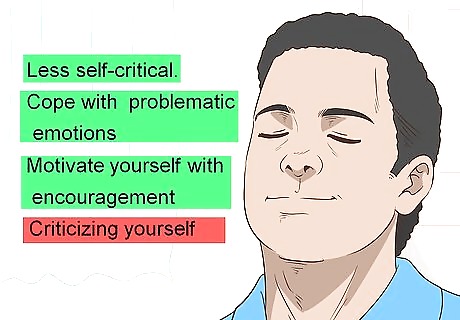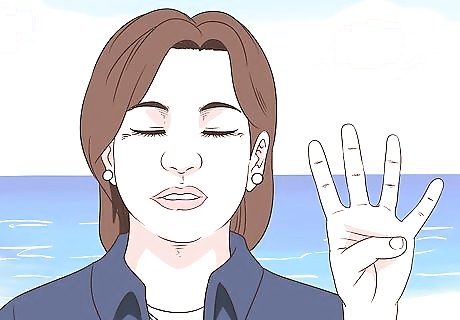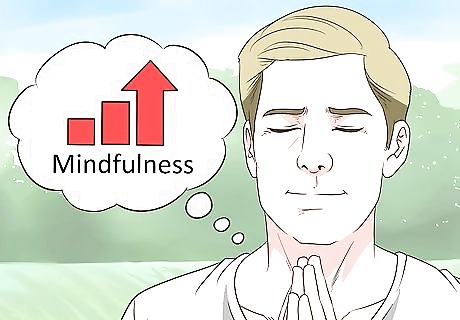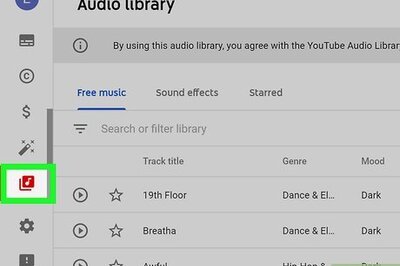
views
Fostering Acceptance

Acknowledge your strengths. It's so easy to look in the mirror and point out your insecurities. But, instead of counting all the things you wish you could be, try counting all the things that you are. Make a list of your strengths, such as the things you are good at, the values that you hold, and the friends that you have. If you are having trouble brainstorming what your strengths are, ask a friend or family member what they think are your most positive traits.

Be honest with yourself. This is one of the hardest things for many of us to do, but it is a necessary step toward navigating your life. In many of today's societies that focus on the individual, we are encouraged to strive for success, and often we look for praise as the acknowledgment of that success. We take any criticism as a negative thing, so we shy away from seeing anything about ourselves that elicits that reaction. Do your best to reframe your perceived flaws as the things that truly make you unique. To try to be honest with yourself, imagine that you are observing yourself through a stranger's eyes. Ask yourself what that person thinks about you, and be as objective as possible based on the facts, rather than what you think about yourself.

Admit Mistakes. Remember that you can't fix it until you can admit there is a problem. You can view mistakes that you make as learning opportunities, as ways to get where you want to go in life. Have faith in yourself, realize only you can change you, only you can control your destiny. Decide what is important to you and set your mind to it. Remove self-doubt and have faith you can become what you envision. When you realize that mistakes are learning opportunities and that your reality isn't always fixed, you will be more likely to persist in the face of challenge, to persevere, and to grow in meaningful ways. Try to see challenges as learning opportunities, and as potential moments for growing. It's all about how you perceive the situation.

Talk to someone you trust. Vent your feelings about your life to a friend or family member who cares for you and will give you the attention that you need. You may find that just by putting your thoughts out in the open that you realize that they are excessive or that your life isn't so bad after all. If you don't feel like just venting, try asking your friend or family member for advice on how to change or improve your life in the ways that you don't want to accept.

Seek professional help. Sometimes it is easier or more efficient to get outside help from a professional. A therapist can help you to learn to accept yourself and your reality. This could be a psychologist, a psychiatrist, or a licensed counselor or other mental health professional. To find a psychologist in your area, try this website: https://locator.apa.org/
Practicing Mindfulness

Learn the benefits of mindfulness. Being mindful of your reality and your sensations has been found to be efficacious in helping individuals to foster self-acceptance. Some forms of mindfulness training involving self-compassion require learning from a professional, but others can be practiced in the comfort of your own home. Some of the benefits of mindful self-compassion include: Learning to be less self-critical. Learning to cope with problematic emotions. Learning to motivate yourself with encouragement rather than criticizing yourself.

Set aside time and set an alarm. Give yourself 10-20 quiet minutes each evening or morning to meditate. Once you set an alarm, you can let your mind go, knowing that you won't be late for work or anything else because your alarm will keep you to your schedule. Make sure your alarm is set on a quiet and pleasant sound to ease you out of your mindfulness session.

Sit upright in a chair. Find your most comfortable chair and then sit down in it. Keep a straight posture and close your eyes to minimize outside distractions. Also place your chair in the quietest part of your house to reduce distractions.

Observe your breathing. Pay attention to the way you breathe but keep it natural, do not adjust it unless you feel that you need to for comfort. Feel every aspect of your breath going in through your nose/mouth, down into your lungs, and energizing your whole body. Feel the old breath coming up and out and sending some of your physical and mental tension away with it. Do your best to avoid slumping, but you might let your body relax a little.

Count your breaths. Keep track of the number of breaths you have taken up to four, and then start over. Only think about your breath and your body. If you find yourself thinking about something else, accept that your attention wandered but do not judge yourself. Just gently bring your mind back to focus on your breathing.

Be consistent. Practice mindfulness meditation each day and gradually you will notice that you become more alert and accepting of yourself and your surroundings as you get better at just being without evaluating. It can take a lot of practice to get this down, so do not give up! Know that it may take a while.
















Comments
0 comment